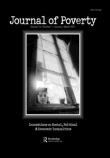
Journal of Poverty
Scope & Guideline
Uncovering the dynamics of poverty and resilience.
Introduction
Aims and Scopes
- Multidimensional Poverty Analysis:
The journal emphasizes research that investigates poverty not just in terms of income, but through a multidimensional lens, including factors like education, health, and living standards. - Socioeconomic Determinants of Poverty:
A core focus is understanding the various socioeconomic factors that contribute to poverty, including education, employment, and access to services, which are critical for developing effective interventions. - Impact of Policy on Poverty:
Research examining the influence of public policy on poverty reduction, including welfare programs, taxation, and social services, is a consistent theme, aiming to assess their effectiveness in real-world contexts. - Behavioral and Psychological Aspects of Poverty:
The journal explores how poverty affects mental health and behavioral outcomes, providing insights into the psychological burdens associated with low-income lifestyles. - Global and Local Perspectives:
The journal publishes studies that analyze poverty from both global and localized viewpoints, offering comparative insights that are crucial for understanding the diverse experiences of poverty. - Community and Grassroots Interventions:
It highlights research on community-led initiatives and grassroots movements aimed at alleviating poverty, providing evidence of effective strategies from the ground up.
Trending and Emerging
- Food Insecurity and Its Impacts:
An increasing number of studies are focusing on food insecurity as a critical aspect of poverty, especially in the context of recent economic crises and the COVID-19 pandemic. - Mental Health and Poverty:
There is a growing trend in exploring the intersection of mental health and poverty, highlighting how economic hardship affects psychological well-being and vice versa. - Technological Solutions to Poverty:
Research on the role of technology, including mobile banking and digital financial inclusion, in alleviating poverty is gaining traction, reflecting the potential of innovation in addressing economic challenges. - Immigration and Poverty Dynamics:
Emerging studies are increasingly examining how immigration status and policies affect poverty levels, particularly in the context of vulnerable populations. - Environmental Justice and Poverty:
The intersection of environmental issues and poverty is becoming a prominent theme, with research exploring how climate change disproportionately affects low-income communities.
Declining or Waning
- Traditional Economic Theories of Poverty:
There has been a noticeable decrease in research exclusively based on traditional economic theories of poverty, suggesting a shift towards more holistic and interdisciplinary approaches. - Focus on Single-Dimensional Poverty Metrics:
The journal seems to be moving away from studies that rely solely on income-based poverty measurements, as there is a growing recognition of the need for multidimensional assessments. - Rural Poverty Studies:
While rural poverty remains important, the volume of research specifically addressing rural contexts appears to have decreased, possibly overshadowed by urban poverty dynamics. - Basic Income Studies:
Research exploring the effectiveness of basic income as a standalone solution to poverty has seen reduced emphasis, with more attention being directed towards integrated and comprehensive policy evaluations. - Historical Poverty Studies:
There is a decline in the publication of studies that focus on historical perspectives of poverty, indicating a trend toward more contemporary and immediate issues affecting poverty today.
Similar Journals
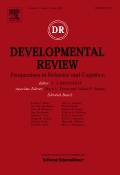
DEVELOPMENTAL REVIEW
Connecting Research to Real-World ApplicationsDEVELOPMENTAL REVIEW is a prestigious academic journal dedicated to advancing the understanding of developmental processes across a wide range of disciplines, including psychology, education, pediatrics, and mental health. Published by Academic Press Inc., Elsevier Science, this journal has established itself as a leader in its field since its inception in 1981, boasting an impressive impact factor and maintaining a Q1 ranking across several categories in the 2023 Scopus metrics. Researchers and professionals benefit from its rigorous peer-review process and comprehensive scope, which encompasses innovative research, theoretical frameworks, and evidence-based practices. The journal's commitment to quality is reflected in its high rankings, including the top tier in developmental and educational psychology, which ensures that only the most impactful and relevant studies contribute to the discourse on child development and related areas. Although DEVELOPMENTAL REVIEW does not offer open access, it serves as a vital resource for those committed to improving practices and outcomes in developmental research and education. Join the conversation that shapes the future of developmental sciences and engages with cutting-edge findings that have the potential to influence policy, practice, and research trajectories.
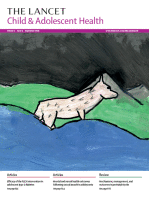
Lancet Child & Adolescent Health
Advancing Knowledge for Healthier FuturesLancet Child & Adolescent Health is a premier academic journal published by Elsevier Scientific Ltd, focusing on groundbreaking research in the fields of Developmental Psychology and Pediatrics. Since its inception in 2017, the journal has quickly gained prominence, evidenced by its remarkable ranking in the Q1 quartile across both its disciplines and its impressive Scopus rankings, placing it in the 99th percentile of Developmental Psychology and Pediatric research. With an emphasis on enhancing child and adolescent health outcomes through high-quality, peer-reviewed articles, the journal serves as an essential platform for researchers, healthcare professionals, and academics. Although it operates without open access, the impact of this journal extends globally as it bridges the gap between innovative research and practical application in clinical settings, elucidating the ever-evolving landscape of child and adolescent health. It is located in the vibrant academic environment of the Netherlands, providing a crucial repository for knowledge aimed at transforming practices and improving well-being for younger populations.

B E Journal of Economic Analysis & Policy
Empowering Policy Through Rigorous Economic AnalysisB E Journal of Economic Analysis & Policy, published by Walter de Gruyter GmbH in Germany, stands as a pivotal resource in the field of economics and econometrics since its establishment in 2001. Boasting an ISSN of 2194-6108 and an E-ISSN of 1935-1682, this journal is committed to advancing the understanding of economic policies and their analysis through rigorous, peer-reviewed research. With an impressive categorization that includes a Q2 ranking in the Economics, Econometrics and Finance (miscellaneous) category and a Q3 ranking in other economics niches as of 2023, it emphasizes the importance of empirical research and robust theoretical frameworks. The journal is indexed in Scopus, reaffirming its credibility, with ranks in the 49th and 32nd percentiles for its respective categories. Researchers, professionals, and students alike will find valuable insights and innovative perspectives within its pages, as it continues to shape discussions around economic policy in an ever-evolving global landscape.
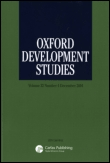
Oxford Development Studies
Advancing Insights in Development Studies and Geography.Oxford Development Studies, published by Routledge Journals, Taylor & Francis Ltd, is a premier academic journal that delves into the dynamic fields of development studies and geography, offering valuable insights and innovative research. With an ISSN of 1360-0818 and an E-ISSN of 1469-9966, the journal has achieved a significant status, being ranked in the Q2 category for both Development and Geography, Planning and Development in 2023. Spanning over several decades, from 1996 to 2024, it provides a critical platform for scholars, practitioners, and students to engage with contemporary issues and policy debates that shape the global development landscape. Notably, it holds a position within the 59th percentile of Scopus rankings for its categories, indicating its substantial influence and contribution to the field. Although it does not currently offer open access, the journal remains accessible to a wide audience through institutional subscriptions. Engaging with the content of Oxford Development Studies is essential for those looking to explore the nexus of research, practice, and policy in development.
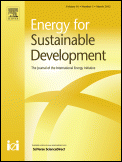
Energy for Sustainable Development
Empowering interdisciplinary dialogue on energy and development.Energy for Sustainable Development, published by Elsevier, is a leading interdisciplinary journal dedicated to advancing the academic discourse at the intersection of energy, sustainability, and development. With an impressive Q1 ranking in the fields of Geography, Planning and Development, and Management, Monitoring, Policy and Law, the journal stands out in the academic community for its rigorous peer-reviewed content that addresses crucial energy challenges and promotes innovative solutions. Since its inception, the journal has transitioned through various converged periods, reflecting on dynamic research trends from 1994 onwards. Notably, it boasts meaningful Scopus rankings, including a position in the top 10% of journals for Geography and Planning. Although it currently does not provide open access, the rich pool of research articles published here serves as a vital resource for researchers, professionals, and students committed to fostering sustainable development practices globally. As energy issues become increasingly pivotal in policy formulation and environmental considerations, Energy for Sustainable Development remains a crucial platform for disseminating impactful knowledge and fostering collaboration across disciplines.

Area Development and Policy
Connecting research and practice for thriving communities.Area Development and Policy is a prominent open-access journal published by Routledge Journals, Taylor & Francis Ltd, focusing on significant contributions to the fields of geography, urban studies, public administration, and environmental science. Launched in 2014 and located in the United Kingdom, this journal has quickly garnered a reputation for excellence, achieving a Q1 ranking in several categories, including Geography, Planning and Development, and Nature and Landscape Conservation as of 2023. Researchers and academics benefit from its broad scope, which encompasses various dimensions of area development and policy-making, while facilitating the dissemination of cutting-edge research through its open-access format. With an exceptional Scopus ranking—particularly within Urban Studies (#32/279)—the journal serves as a crucial platform for scholars seeking to advance discourse in these fields. As it converges its focus through 2024 and beyond, Area Development and Policy continues to be an essential resource for professionals and students dedicated to understanding the complexities of regional development and the policies that shape our environments.

SOCIAL INDICATORS RESEARCH
Elevating Understanding of Human ConditionsSOCIAL INDICATORS RESEARCH is a prominent peer-reviewed journal published by SPRINGER, focused on delivering high-quality research within the fields of social sciences, including sociology, political science, and developmental psychology. With a history spanning from 1974 to 2024, this journal has established itself as a vital resource for scholars interested in the multifaceted aspects of social indicators, quality of life, and measurement of subjective well-being. The journal boasts an impressive Q1 quartile ranking in Arts and Humanities, Social Sciences, and Sociology, reflecting its influence and reputation within these domains. Despite operating under a traditional subscription model, it ensures accessibility to a wide audience through its comprehensive studies and findings. The journal continuously aims to bridge the gap between empirical research and practical applications, making it an essential read for researchers, professionals, and students seeking to advance their understanding of social phenomena and indicators.
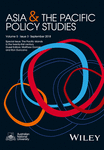
Asia & the Pacific Policy Studies
Unlocking the potential of Asia-Pacific policy studies.Asia & the Pacific Policy Studies, published by WILEY, is a premier open access journal dedicated to advancing the understanding and discourse surrounding policy issues in the Asia-Pacific region. With an ISSN of 2050-2680 and an e-ISSN of 2050-2680, the journal has been a vital platform for interdisciplinary research since its inception in 2014. Recognized for its credible contributions, it holds a Q2 ranking in fields such as Economics, Political Science, and Sociology as of 2023, with Scopus rankings placing it in the top quartiles of various relevant disciplines, including Political Science and International Relations, where it ranks #144 out of 706 journals. The journal’s open access model ensures that high-quality research is readily available to a global audience, fostering collaboration and innovation. Scholars, researchers, and students are encouraged to contribute to and engage with the critical analyses presented, which encompass a wide range of topics from public administration to strategic management, ultimately enhancing policy formulation and implementation across the Asia-Pacific landscape.

Poverty & Public Policy
Navigating the complexities of poverty and policy.Poverty & Public Policy is an esteemed journal published by WILEY that focuses on the intersection of poverty issues and public policies aimed at alleviating social disparities and enhancing quality of life. With an ISSN of 1944-2858, this journal serves as a critical resource for researchers, policymakers, and practitioners in the fields of Cultural Studies, Sociology, and Political Science. Recognized for its academic rigor, it boasts a commendable Q1 ranking in Cultural Studies and a Q2 classification in Sociology and Political Science as per the 2023 quartiles. The journal is accessible to a diverse audience and aims to provide insights and analyses that foster a deeper understanding of poverty-related challenges and policy responses. Converging from 2009 to 2024, it continues to contribute to scholarly discourse and policy formation, making it an indispensable addition for anyone committed to addressing the complex issues surrounding poverty on a global scale.
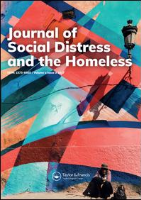
Journal of Social Distress and the Homeless
Fostering Understanding, Inspiring ActionJournal of Social Distress and the Homeless is a pivotal platform dedicated to the exploration and dissemination of research focused on the multifaceted issues surrounding homelessness and social distress. Published by Routledge Journals, Taylor & Francis Ltd in the United Kingdom, this journal seeks to foster a deeper understanding of the complexities inherent in social marginalization and its impact on individuals and communities. With ISSN 1053-0789 and E-ISSN 1573-658X, it provides researchers, practitioners, and policymakers with rigorously reviewed articles that bridge theoretical insights and practical application, addressing vital questions that shape public perception and policy regarding homelessness. Though listed in the Q4 category across various disciplines such as Health Professions, Psychology, and Social Sciences, the journal maintains a respectable rank of #97/426 in its field, placing it in the 77th percentile of Scopus. This positions it as an important resource despite current access options being limited, making it essential for scholars who aim to contribute to the evolving dialogue on social justice and public health. Join the conversation that impacts real lives through critical research and innovative solutions.